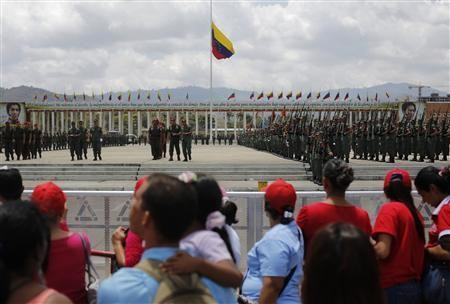Thousands Pay Respects to Chavez in Caracas, But Where Now for His Body?

Thousands lined the streets of Caracas to pay tribute at the funeral procession of Hugo Chavez, as debate about what to do with his body intensifies, and critics accuse the government of exploiting his death.
The fiery Venezualan socialist leader's coffin was taken 12 miles from an army academy to be laid to rest at a military museum, with red shirted 'Chavista' supporters packing Caracas to catch a glimpse of the cortege.
"You are a giant," his daughter Maria Gabriela said, addressing military and political dignitaries at a religious service before the procession began.
"Fly freely and breathe deep with the winds of the hurricane. We will care for your fatherland and defend your legacy. You will never leave, your flame is in our hands."
In the 10 days of official mourning since his death from cancer on 5 March, crowds have been paying their respects as his coffin lay in state,
But debate still rages over his final resting place.
Originally, the government wanted his body to be embalmed like those of the Russian Bolshevik revolutionary leader Lenin or Chairman Mao of China, but Russian experts say that may not now be possible as the body has been left for too long to be preserved.
Parliament was due this week to debate whether to amend the constitution to allow Chavez to be buried alongside his hero Simon Bolivar in the National Pantheon. Normally, leaders must be dead for at least 25 years before they can be buried alongside the country's most important figures.
Another possibility is to carry out Chavez's dying wish and bury him in the village of Barinas alongside his grandmother, who raised him there in a mud hut.
Meanwhile, the contest between Chavez's preferred successor and acting president Nicolas Maduro, and opposition leader Henrique Capriles for victory ahead of the 14 April election has become more acrimonious.
This week a cartoon of Capriles wearing pink shorts and a swastika armband was broadcast on state media.
However Capriles, who wants to reform the country along Brazillian lines, has hit back, accusing his rivals of using Chavez's death as political capital. He said: "We urge those indiscriminately using the president's name for the capture of votes to halt this perverse method of electoral proselytism.
"Let's have a decent campaign, without unfair advantages or abuses of power."
© Copyright IBTimes 2025. All rights reserved.






















